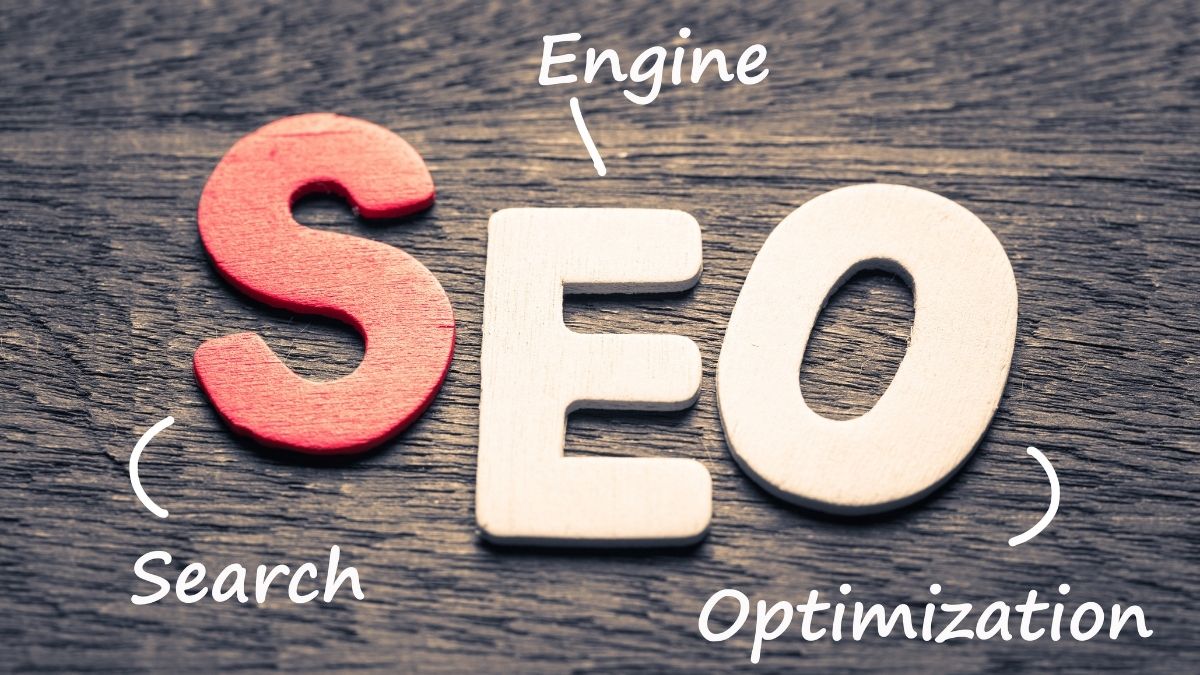
In recent years, travel and tourism have become extremely competitive, with hotels and chains competing in increasingly rich search results against online travel agencies (OTAs) and booking sites.
The industry has also been significantly impacted by the COVID-19 pandemic, and the effects are still being felt.
With the pandemic easing in some states and countries, there are signs of life as people begin to travel again.
However, user behavior has changed dramatically, so hotel brands must adjust their SEO strategies to drive incremental bookings, traffic, and revenue if they want to acquire travelers now and in the future.
Here is a list of SEO best practices for hospitality strategies, tactics, and tools to help you achieve that goal in 2022 and beyond.
Utilize Data to Prioritize Destinations
Look no further than Google Destination Insights for prioritizing locations and ensuring your hotel ranks in the top positions.
Where people are going is especially important in the travel industry. Allow the data to tell you this so you can compare trends and focus on ensuring high visibility for those destinations.
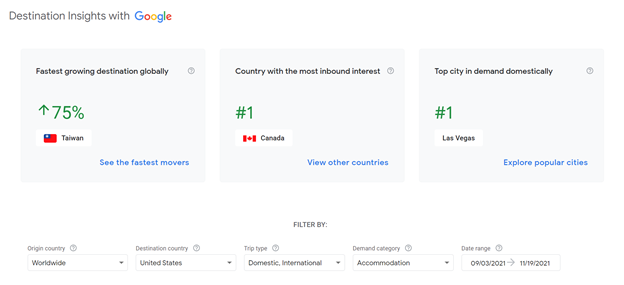
For example, from 09/03 to 11/19, Las Vegas was the most popular destination in the United States.
If I were working with the Bellagio, I would make certain that I am ranking on the first page for Las Vegas hotels, brand, brand + geo keywords, restaurants, COVID precautions, and other related keywords.
Google Hotel Insights is another excellent tool for providing insights for your SEO strategy. It provides information on who is looking to stay in your area, as well as tools and tips to help your business stand out from the crowd.
Looking at data from the New York area, where consumers looking to book travel are up 50% to 75% year on year (YOY).
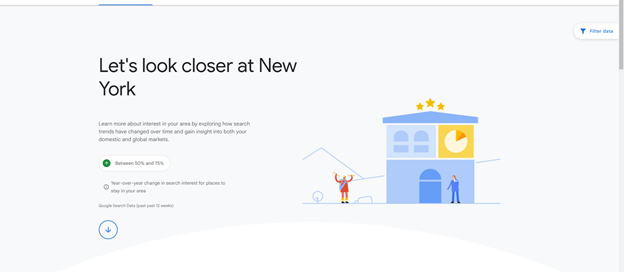
If you own a travel company in the area, this is useful information to help you focus on destination pages. Examine existing content and your striking distance keywords for opportunities to expand or repurpose content with nearby things to do and city events.
Another useful feature of this tool is the ability to see whether users are searching for this information in the United States or elsewhere. This could aid in the planning of your content strategy and PPC campaigns to target international travelers and reach an even larger number of potential guests.
If you own a travel company in the area, this is useful information to help you focus on destination pages. Examine existing content and your striking distance keywords for opportunities to expand or repurpose content with nearby things to do and city events.
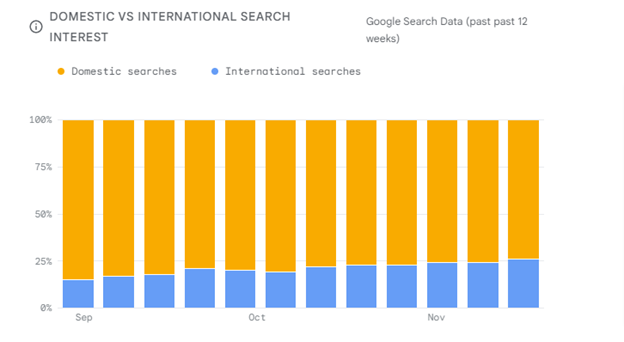
Satisfy Travelers’ Needs With A Brand Concierge Strategy
Another useful feature of this tool is the ability to see whether users are searching for this information in the United States or elsewhere. This could aid in the planning of your content strategy and PPC campaigns to target international travelers and reach an even larger number of potential guests.
The process of booking a hotel room is not a straight line. Many factors must be considered before a traveler book a trip and visit a hotel website:
- Is the location appealing to me?
- What can be done?
- What’s in the neighborhood?
- How are the dining establishments?
- Is there vegan food available?
Of course, these are just examples. There could be thousands of different combinations of preferences.
Travelers conduct research months in advance, in some cases. When looking for a place to stay, 91% of travelers use search engines, and the majority (81%) use Google as their source of travel inspiration.
As a result, hotels require an SEO brand concierge strategy to connect with travelers throughout the user journey.
This includes a comprehensive content strategy and a thorough understanding of guest profiles, which should include generational segments like Millennials and Boomers as well as interest-based segments like Adventurers and Foodies.
Each of these segments necessitates content that speaks to individual travelers, and this content must be placed both above and within the specific hotel destination.
To rank well for “Foodie Destinations” or “Dining Experiences Around the World,” for example, a hotel brand website needs content that curates the types of experiences that exemplify the purpose of a concierge.
These experiences cannot be limited to what the hotel brand has to offer. Consider this: how would you rate your interaction with a concierge if all they recommended was the restaurant in the lobby?
Through persona identification, journey mapping, and content, the brand concierge strategy necessitates rethinking hotel brand websites and their role in connecting with travelers.
This type of strategy necessitates an understanding of search, topic connections, and the intent stages of queries made throughout the traveler’s journey.
Optimize Your Google My Business and Local Listings
By optimizing your Google Business Profile, your hotel listings can appear in the Map Pack in addition to the regular organic listings for geo-modified keywords on the page.
This can result in additional revenue, bookings, and organic traffic.
Fully optimized listings assist in prioritizing your business, ensuring that your hotel listings appear at the top of local searches, and providing a consistent customer experience to drive bookings and retention.
Here are my top tips for doing so:
- Improve your listings in major search engine directories. Make Google Posts and optimize photos so that visitors can see the hotel.
- Manage and respond to customer feedback. Local reviews are regarded as the most useful content that potential guests rely on when making purchasing decisions. Respond to reviews to demonstrate that you value your customers and the feedback they provide about your company. This is critical because Google gives higher rankings to businesses that respond to their reviews.
- Respond to Q&A and create a FAQ section so that your hotel brand can control the conversation about your company.
- Make sure your Google Maps pin is in the right place so that users can find your hotel.
- Display beautiful photos and videos of the hotel, rooms, and amenities such as the restaurant (s).
- Use attributes to distinguish your location and provide additional information relevant to travelers such as health and safety precautions, Wi-Fi, accessibility, and so on.
- Always keep hotel, restaurant, spa, and other hours current so that users know when they will be open and closed.
Collaborate with Your Social Media Team
Share information about the most popular destinations, travel tips, hotel amenities, events, and nearby attractions.
This can help maximize visibility, increase brand exposure, and generate more links and buzz about your hotel, all of which can improve visibility, traffic, and revenue.
More tips and tricks for getting the most mileage out of your content across platforms can be found in Content Repurposing for Travel Brands: A Complete Guide.
Optimize for the most important web elements
It’s critical to optimize your site for Core Web Vitals in a competitive industry like travel and tourism.
These three combined metrics are used to assess a website’s performance across a set of key performance indicators, which will become a ranking signal in May 2021. They are as follows:
- How long it takes for the main section of a website to load (LCP).
- How long does it take for the website to become interactive? (FID).
- How much the webpage layout moves when it loads (CLS).
To improve on CWV, hotel websites should have clean code, use a CDN for large images, externalize JS and CSS, and be mobile-friendly and secure, among other things.
There is no penalty for not optimizing to CWVs, but it could be the factor that propels you past tough competitors.
Make Use Of FAQs And Be Prepared For Voice
Your potential guests have questions, and your hotel brand should be able to answer them. Include FAQs on your website to assist current and prospective guests in finding the information they require, which can also help to reduce calls to the hotel.
The FAQs should be structured data-marked so that they appear in rich results and maximize organic search potential.
With consumers using voice search, your content must be voice search optimized as well:
Hello, Google. Does the Hilton in Boston have a pool?
If your brand appears as a result of a voice search query like this, it can influence whether or not a user decides to book with your hotel.
Examining the Visibility and Performance of Competitors
The way people look for hotels has changed. That is why it is critical to constantly monitor your competitors’ rankings and see:
- What kind of content are they creating?
- What percentage of the market they control.
- What new SEO strategies are they attempting.
- How are they obtaining links?
- And how quickly their pages load, and so on.
Determine what tactics and strategies you can glean that may be worth testing.
Brands may be hesitant to add content to their websites because they do not want to disrupt the user experience. However, your competitors are almost certainly adding content.
And if you discover that one of your biggest competitors has added content to a key destination page, with FAQs and structured data, and they now rank on the first page for a key destination term, they may be getting incremental bookings, improving brand awareness, and so on.
That is why it may be worthwhile to create and promote content to keep up with, if not outperform, the competition.
Final Thoughts
The pandemic has had an impact on all aspects of life, including the travel and tourism industry. Hopefully, things will improve quickly and travel will resume to pre-pandemic levels.
For the time being, hotel brands must be adaptable and experiment with new content ideas and SEO strategies, as well as monitor competitors and understand their guests.
Travel brands can drive incremental bookings, traffic, and revenue by understanding who their customers are, what they want, and how to engage them with content that meets their information needs.
Need help with our free SEO tools? Try our free Keywords Suggestion Tool, Keyword Density Checker,
Keyword Position.
Learn more from SEO and read Top 42 SEO Writing Tips To Master A Combination Art.
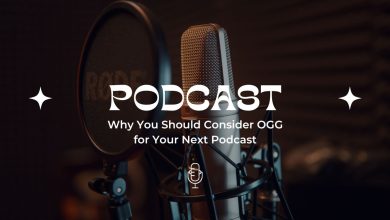




4 Comments